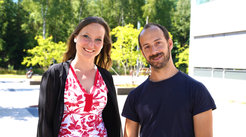First Research Group at Microcosm Earth Center
Microbiologist Dr. Judith Klatt carries out research on the topic of Biogeochemistry
How do microorganisms influence the nutrient and carbon cycles of our Earth? Which processes begin, almost invisibly, at the microbial level to ultimately culminate in the major biogeochemical processes of our Earth? Dr. Judith Klatt addresses these questions, starting this month as the first of three research groups at the new Future Center which will be officially opened this September.

The Future Center is a joint project of the Max Planck Institute for Terrestrial Microbiology (MPI-TM) and the Philipps University of Marburg (UMR). It has an initial duration of 7 years and is financially supported by the state of Hesse.
Alongside the SYNMIKRO center, it is intended to be a further hub of interdisciplinary cooperation in the microbiological research landscape of Marburg. Its scientific approach covers all scales of life: In addition to the understanding of mechanisms on the smallest scale, i.e. on the cellular and molecular level, observations of interactions in natural ecosystems will also be included.
Tobias Erb, who is currently Managing Director at the Max Planck Institute for Terrestrial Microbiology and co-initiated the Future Center, explains, "With the Future Center, we want to attract the next generation of outstanding scientists to Marburg, and enable them to conduct cutting-edge microbiological research beyond the boundaries of traditional disciplines."
This interdisciplinary perspective is also a key feature of Philipps University's first research group, which has been based in the Chemistry Department's building on Marburg´s Lahnberge since June 2022. Geomicrobiologist Judith Klatt addresses chemical, geological, and biological topics and explores her questions in a wide range of environments: contaminated soils, hydrothermal vents, coral reefs, lakes, microbial mats, animal-associated microbes, and more. In line with the Future Center, their research questions and approaches range from molecular processes to the level of microbial interactions with their environment. "Our methodological strengths lie in the online observation of microbial processes directly in the environment, without "disturbing" the microorganisms," explains the research group leader. "In doing so, we work on temporal and spatial scales that are sufficiently small to gain insight into the microbial perspective of the environment. In particular, we focus on the development and use of microsensors. But we also use classical microbiological approaches to better understand the physiology of the microbial key players."
After completing her doctorate in Bremen and a post-doctoral period at the University of Michigan (USA), she spent the past few years at the Max Planck Institute for Marine Microbiology, the Bremen sister institute of the Marburg MPI. Here, for example, she developed the idea for a possible connection between the Earth's rotation rate and the increase in global oxygen levels in early Earth history.
Under the roof of the new center, there will also be a close relationship with the Max Planck Institute: The latter coordinates the "Future Center Microcosm Earth" and will also soon be represented by its own research group at the center.
Judith Klatt is looking forward to this cooperation: "Marburg is an epicenter of microbiology, and I am excited about the new perspectives that this collaboration can offer me. On a research level, I expect to gain even deeper insights into the molecular mechanisms behind the measured microbial processes. After all, they are ultimately important puzzle pieces in the overall understanding of large-scale process regulation and evolution."
"With Judith Klatt, we are pleased to be able to attract an excellent researcher to Marburg and are firmly convinced that she will further develop the cutting-edge microbiological research at Philipps University and the Max Planck Institute for Terrestrial Microbiology into the future," says Prof. Dr. Gert Bange, Vice President for Research at Marburg University.
Now, the first task is to put together the new research team. Candidates interested in a PhD position will soon be invited to apply. For more information, contact Judith Klatt (judith.klatt@uni-marburg.de).












